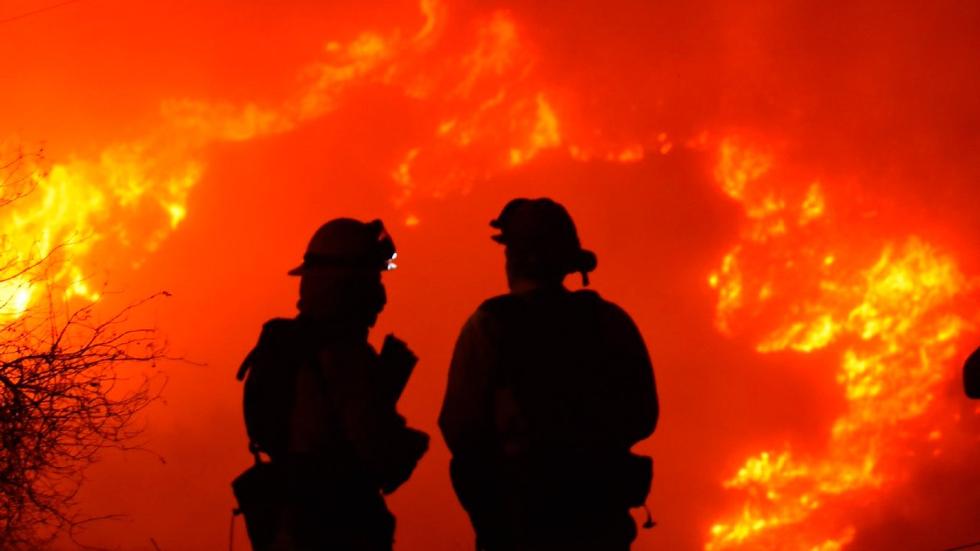Chair's Column: December 2017
 Photo Source: www.weather.com |
Dear students, colleagues, and friends of Hunter Geography,
Now that we are into the home stretch of the semester, I am writing to wish all of you good luck on your final exams and projects. Have a happy holiday, a good winter break, and a peaceful year ahead.
I would like to share with you a few timely updates in the area of climate science and natural resources. On Tuesday, the National Oceanic and Atmospheric Administration released its annual Arctic Report Card [1], summarizing the current state of the Arctic environment. As predicted by climate scientists decades ago, this region is warming approximately twice as fast as the rest of the planet. Sea ice (ice that forms from sea water freezing, and then floats on the ocean surface) is declining at a rate faster than any time in at least the last 1500 years. Thicker ice, which is more stable than thinner ice, comprises only around 21% of all Arctic ice, compared to 45% three decades ago. You can read about these and many other changes to the natural environment, such as to the land and ocean biota, directly from the report card web site [1]. These changes are already having significant impacts on many aspects of human society, including commerce, international political disputes over resources, and even the mental health of native peoples [2]. You may have wondered why, back in 2007, Russian President Vladimir Putin sent a submarine to plant Russian flags on the sea floor under the Arctic Ocean [3]: I suppose he believes that climate change is real, and that when the ice clears his country will lay claim to minerals and fossil fuels found beneath the sea floor.
I am sure you have all heard about the drought and record-breaking fire season this year in western North America [4]. Earlier in the season Mount Rainier in Seattle disappeared under the smoky haze from fires in British Columbia [5]. Most recently the fires are affecting people and homes in and around Los Angeles [6]. These fires are caused by a complex combination of meteorology, physics, geography, and human errors; and as of this writing the end of these dangerous conditions is not yet in sight [6,7]. I wish the best to my colleagues and friends who continue to deal with the situation in California.
There is probably no need to remind you of the unusual hurricane season about which we heard so much this last fall, including the ongoing suffering of our friends in Puerto Rico. But did you know that heat waves, fires, and storms were also extreme this year in parts of Asia and Europe [8]? Not all of these can be directly attributed to climate change, but the science of “attribution”, in which scientists estimate the increased likelihood of certain events under changing climatic conditions, has made great strides in recent years. For example, two recent reports suggest that the likelihood of Hurricane Harvey was significantly increased by recent climatic changes [9].
Speaking of water, I’d like to give a shout out to some friends of our department at the Grace Communications Foundation who recently released the latest version of their web-based water footprint calculator, where you can estimate your water usage based on some basic information and assumptions [10]. They also provide tips on how to save water, resources for students and educators, as well as related articles such as water use associated with the food you eat [10]. Coincidentally, there is a new book entitled “Eat Less Water” by Florencia Rimarez that gives practical instructions for cooking with a smaller water footprint [11].
Looking forward to seeing you all next semester when we are all well rested and ready to tackle the challenges ahead!
Allan Frei
Chair, Department of Geography, Hunter College
December 14, 2017
[1] http://www.arctic.noaa.gov/Report-Card
[2] www.theguardian.com/environment/2017/aug/24/russian-tanker-sails-arctic-without-icebreaker-first-time?CMP=share_btn_link; https://www.washingtonpost.com/world/national-security/in-a-changing-arctic-a-lone-coast-guard-icebreaker-maneuvers-through-ice-and-geopolitics/2017/09/03/dfad84d4-7d12-11e7-9d08-b79f191668ed_story.html?utm_term=.4b52002b6f24 ; https://www.nytimes.com/2017/12/02/technology/from-the-arctics-melting-ice-an-unexpected-digital-hub.html?rref=collection%2Fsectioncollection%2Fus&action=click&contentCollection=us®ion=stream&module=stream_unit&version=latest&contentPlacement=1&pgtype=sectionfront ; https://www.nytimes.com/interactive/2017/11/25/climate/arctic-climate-change.html?rref=collection%2Fsectioncollection%2Fworld&action=click&contentCollection=world®ion=stream&module=stream_unit&version=latest&contentPlacement=1&pgtype=sectionfront&_r=0
[3] www.nytimes.com/2007/08/03/world/europe/03arctic.html?mcubz=1
[4] http://www.newsweek.com/california-fire-map-update-photos-destruction-across-los-angeles-and-ventura-746764 ; http://globalnews.ca/news/3585149/photos-wildfires-burning-around-b-c
[5] http://www.seattletimes.com/seattle-news/weather/before-and-during-seattles-wildfire-haze-watch-mount-rainier-disappear/ ; https://www.nytimes.com/2017/10/11/us/california-wildfires-firefighters.html?_r=0 ; https://insideclimatenews.org/news/10102017/fires-napa-sonoma-california-climate-change-worst-wildfire-season
[7] https://www.forbes.com/sites/marshallshepherd/2017/10/11/the-science-of-diablo-winds-fanning-california-wine-country-fires/#63907fda2751 ; https://weather.com/photos/news/2017-12-05-southern-california-wildfires-images
[8] https://www.wunderground.com/cat6/historic-heat-wave-sweeps-asia-middle-east-and-europe ; https://www.nytimes.com/2017/08/12/world/europe/portugal-forest-fires-pedrogao-grande.html?mcubz=1 ; https://www.nytimes.com/2017/10/16/world/europe/tropical-storm-ophelia-ireland.html ; https://www.nytimes.com/2017/10/16/world/europe/portugal-spain-fires.html?_r=0 ; https://www.buzzfeed.com/anupkaphle/south-asia-is-also-experiencing-the-worst-flooding-in?utm_term=.rl4Q1Oe4EO#.loy2R7vXO7
[9] http://onlinelibrary.wiley.com/doi/10.1002/2017GL075888/full ; http://iopscience.iop.org/article/10.1088/1748-9326/aa9ef2 ; https://www.ametsoc.org/ams/index.cfm/publications/bulletin-of-the-american-meteorological-society-bams/explaining-extreme-events-from-a-climate-perspective/ ; http://www.pnas.org/content/112/13/3931.abstract?ijkey=f0872537a210088f97bf91e2907a6dcb5157f214&keytype2=tf_ipsecsha
[10] https://www.watercalculator.org/ ; https://www.watercalculator.org/save-water/ ; https://www.watercalculator.org/water-use/ ; https://www.watercalculator.org/education/
[11] Available from Barnes & Noble, Amazon, and Good Reads
